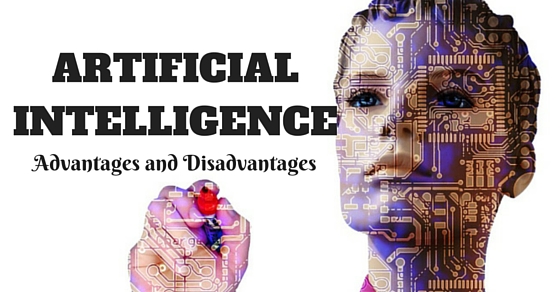What is Artificial Intelligence (AI)?
Artificial Intelligence is designing machines that have the ability to think. It is the intelligence of machines.
Is it a boon or a bane to the future of human existence?, is an ongoing debate.
The very idea to create artificial intelligence is to make the lives of humans easier. Researchers of artificial intelligence want to bring in the emotional quotient to the machines along with the general intelligence.
Smart navigation:
In this article, we will be discussing the below-enlisted topics,
- Artificial Intelligence Investment Trends
- Philosophy of AI
- Goals of AI
- What Contributes to AI
- What is AI Technique
- History of AI
- Applications of AI
- Advantages of Artificial Intelligence
- Disadvantages of Artificial Intelligence
- AI Safety Research
- Artificial Intelligence Infographic
Artificial Intelligence Investment Trends:
- Worldwide AI Spending to Hit $35.8 Billion in 2019 Share on X – source wsj
- Artificial Intelligence in Healthcare Market Size Worth US$ 8 Bn by 2026 Share on X – source globalnewswire
- AI Spending Projected To Reach $35.8 Billion This Year Share on X – source mediapost
- Asia-Pacific spending on AI systems will reach $5.5 billion this year up 80% from 2018 Share on X – source techcrunch
- Artificial Intelligence Software Market to Reach $118.6 Billion in Annual Worldwide Revenue by 2025 Share on X – source tractica
Now as we have got an idea of what is AI (artificial intelligence), let us have a deeper understanding of things related to it as well.

Philosophy of AI:
With the rise of computers, the process of doing manual work has been decreased to a great extent.
Now that computers are used almost in every sector, humans are highly dependent on them.
As we are totally surrounded by machines and computer systems, this gave humans a general thought like “Can a machine think and behave as humans do? “. Though this was a general thought, its curiosity leads to the development of artificial intelligence (AI).
AI development has begun with the intention of developing intelligence in machines similar to that of humans.
Goals of AI:
The main AI goals are mentioned below,
Creating expert systems:
The systems which are mentioned here should have the ability to display intelligent behaviour, learn, demonstrate, explain, and provide the users with the best pieces of advice.
Implementing Intelligence in machines:
This intends to develop systems which can understand, think, learn, and behave like humans.
What Contributes to AI?
As per the definition of AI, it is the science and technology which are based on regiments like Computer Science, Biology, Psychology, Linguistics, Mathematics, and Engineering.
The main focus of AI is to bring in advancement to computer functions associated with human intelligence, which includes reasoning, learning, and problem-solving.
What is AI Technique?
Some of the weird properties of knowledge in the real world are
- The volume is huge, beyond unimaginable
- Not in an organized or proper format
- It regularly undergoes changing
The AI technique is a process to format and uses the knowledge effectively
- The knowledge should be graspable
- Must be easily adaptable to correct errors
- Can be used efficiently even if it is incomplete
History of AI:
Artificial intelligence (AI) can be shortly defined as a subfield of computer science. The main advantage of using artificial intelligence machines, computers, etc is to impersonate the activities which were earlier done by human beings and ease their lives.
Now to get a better idea about artificial intelligence, let us take a view at the history of artificial intelligence which sprouted almost 100 years ago or specifically in the 20th century.
Brief History of Artificial Intelligence:
1923 – The term ‘robot‘ was used for the first time in English by a Karel Capek play called “Rossum’s Universal Robots (RUR)” which was premiered in London.
1943 – Base work of neutral networks
1945 – The invention of the term ‘robotics‘ by Isaac Asimov, a Columbia University scholar
1950 – The introduction of ‘Turing test’ by ‘Alan Turing‘ for the analysis of intelligence. Also, a seminal paper was published named “computing machinery and intelligence“.
1956 – The term “artificial intelligence” was first originated by John McCarthy. A demo of AI program at Carnegie Mellon University was attempted.
1958– The innovation of LISP programming language for AI by John McCarthy
1964 – A thesis by Danny Bobrow at MIT proved that computers can apprehend normal language to solve algebra word problems accurately.
1965 – ELIZA, an interactive program that converts messages in English was introduced for the first time by Joseph Weizenbaum at MIT
1969– Scientists and researchers designed a robot named Shakey, which was armed with perception, locomotion, and problem-solving ability at Stanford Research Institute.
1973 – The invention of popular Scottish robot ‘Freddy‘which is efficient enough to locate, collect and build models using vision was developed by Edinburgh University’s Assembly Robotics group.
1979 – Origination of first computer-controlled autonomous vehicle, Stanford Cart
1985– Harold Cohen designed and developed ‘Aaron’ a drawing program
1990 – Important breakthroughs in the AI sector was noticed in this year, some of them are
- A remarkable development in machine learning
- Multi-agent planning
- Data mining
- Usage of Vision by robots
- Games
- Web Crawler
- Virtual Reality
- Case-based reasoning
- Scheduling
- Normal language comprehension and translation
1997 – Garry Kasparov, world chess champion was defeated by the Deep Blue Chess Program
2000 – MIT showcased kismet, a robot with a face that has the ability to exhibit emotions
The Nomad robot travels through Antarctica’s remote regions and discovers meteorites.
The availability of robotic pets was opened in the market.
Applications of AI:
Artificial intelligence AI has a huge impact on many of the fields and some of them are mentioned below,
Gaming :
It plays an important role in strategic games like chess, tic tac toe etc. Here the machine should be able to think of multiple possible steps based on heuristic knowledge.
Natural Language Processing:
Able to communicate with the computers that understand human used natural language.
Expert Systems:
There are a few applications which incorporate machine, programming, and some special data to confer thinking and prompting. They give clarification and exhortation to the users.
Vision Systems:
These type of systems are able to understand, interpret and grasp visual input on the computer.
Ex: A spying plane or drone takes pictures, which are utilized to make sense of spatial data or guide of the zones and areas.
Speech Recognition:
You will find some systems which are able to understand the language which is used by humans and talk to them. They can even understand the slang, background noise, accent etc.
Handwriting Recognition:
This special software will be able to read the text written either by a pen or stylus on paper or screen respectively. It also understands the letter shapes and will convert it into editable text.
Intelligent Robots:
Robots are one of the best creation by humans. They can do multiple tasks within no time. Though they cannot be alternate to humans but are very efficient when doing any tasks.
They are comprised of sensors which detect few physical data like light, heat, temperature, movement, pressure etc just like humans. They also possess good processors and huge memory.
The best part about these systems is that they are adaptable to the environment around them.
Now, let us look into the pros and cons of artificial intelligence.
| AI Advantages | AI Disadvantages |
|---|---|
| Error Reduction | High Cost |
| Difficult Exploration | No Replicating Humans |
| Daily Application | No Improvement with Experience |
| Digital Assistants | No Original Creativity |
| Repetitive Jobs | Unemployment |
| Medical Applications | |
| No Breaks |
Advantages of Artificial Intelligence:
Artificial intelligence is complex in nature. It uses a very complicated mixture of computer science, mathematics and other complex sciences. Complex programming helps these machines replicate the cognitive abilities of human beings.
1. Error Reduction:
Artificial intelligence helps us in reducing the error and the chance of reaching accuracy with a greater degree of precision. It is applied in various studies such as exploration of space.
Intelligent robots are fed with information and are sent to explore space. Since they are machines with metal bodies, they are more resistant and have a greater ability to endure the space and hostile atmosphere.
They are created and acclimatized in such a way that they cannot be modified or get disfigured or breakdown in a hostile environment.
2. Difficult Exploration:
Artificial intelligence and the science of robotics can be put to use in mining and other fuel exploration processes. Not only that, these complex machines can be used for exploring the ocean floor and hence overcome the human limitations.
Due to the programming of the robots, they can perform more laborious and hard work with greater responsibility. Moreover, they do not wear out easily.
3. Daily Application:
Computed methods for automated reasoning, learning and perception have become a common phenomenon in our everyday lives. We have our lady Siri or Cortana to help us out.
We are also hitting the road for long drives and trips with the help of GPS. The smartphone is an apt and everyday example of how we use artificial intelligence. In utilities, we find that they can predict what we are going to type and correct the human errors in spelling. That is machine intelligence at work.
When we take a picture, the artificial intelligence algorithm identifies and detects the person’s face and tags the individuals when we are posting our photographs on social media sites.
Artificial Intelligence is widely employed by financial institutions and banking institutions to organize and manage data. Detection of fraud uses artificial intelligence in a smart card based system.
4. Digital Assistants:
Highly advanced organizations use ‘avatars’ which are replicas or digital assistants who can actually interact with the users, thus saving the need for human resources.
For artificial thinkers, emotions come in the way of rational thinking and are not a distraction at all. The complete absence of the emotional side, makes the robots think logically and take the right program decisions.
Emotions are associated with moods that can cloud judgment and affect human efficiency. This is completely ruled out for machine intelligence.
5. Repetitive Jobs:
Repetitive jobs which are monotonous in nature can be carried out with the help of machine intelligence. Machines think faster than humans and can be put to multi-tasking. Machine intelligence can be employed to carry out dangerous tasks. Their parameters, unlike humans, can be adjusted. Their speed and time are calculation based parameters only.
When humans play a computer game or run a computer-controlled robot, we are actually interacting with artificial intelligence. In the game we are playing, the computer is our opponent. The machine intelligence plans the game movement in response to our movements. We can consider gaming to be the most common use of the benefits of artificial intelligence.
6. Medical Applications:
In the medical field also, we will find the wide application of AI. Doctors assess the patients and their health risks with the help of artificial machine intelligence. It educates them about the side effects of various medicines.
Medical professionals are often trained with artificial surgery simulators. It finds a huge application in detecting and monitoring neurological disorders as it can simulate the brain functions.
Robotics is used often in helping mental health patients to come out of depression and remain active. A popular application of artificial intelligence is radiosurgery. Radiosurgery is used in operating tumours and this can actually help in the operation without damaging the surrounding tissues.
7. No Breaks:
Machines, unlike humans, do not require frequent breaks and refreshments. They are programmed for long hours and can continuously perform without getting bored or distracted or even tired.
Disadvantages of Artificial Intelligence:
1. High Cost:
Creation of artificial intelligence requires huge costs as they are very complex machines. Their repair and maintenance require huge costs.
They have software programs which need frequent up gradation to cater to the needs of the changing environment and the need for the machines to be smarter by the day.
In the case of severe breakdowns, the procedure to recover lost codes and reinstating the system might require huge time and cost.
2. No Replicating Humans:
Intelligence is believed to be a gift of nature. An ethical argument continues, whether human intelligence is to be replicated or not.
Machines do not have any emotions and moral values. They perform what is programmed and cannot make the judgment of right or wrong. Even cannot take decisions if they encounter a situation unfamiliar to them. They either perform incorrectly or breakdown in such situations.
3. No Improvement with Experience:
Unlike humans, artificial intelligence cannot be improved with experience. With time, it can lead to wear and tear. It stores a lot of data but the way it can be accessed and used is very different from human intelligence.
Machines are unable to alter their responses to changing environments. We are constantly bombarded by the question of whether it is really exciting to replace humans with machines.
In the world of artificial intelligence, there is nothing like working with a whole heart or passionately. Care or concerns are not present in the machine intelligence dictionary. There is no sense of belonging or togetherness or a human touch. They fail to distinguish between a hardworking individual and an inefficient individual.
4. No Original Creativity:
Do you want creativity or imagination?
These are not the forte of artificial intelligence. While they can help you design and create, they are no match to the power of thinking that the human brain has or even the originality of a creative mind.
Human beings are highly sensitive and emotional intellectuals. They see, hear, think and feel. Their thoughts are guided by the feelings which completely lacks in machines. The inherent intuitive abilities of the human brain cannot be replicated.
5. Unemployment:
Replacement of humans with machines can lead to large-scale unemployment.
Unemployment is a socially undesirable phenomenon. People with nothing to do can lead to the destructive use of their creative minds.
Humans can unnecessarily be highly dependent on the machines if the use of artificial intelligence becomes rampant. They will lose their creative power and will become lazy. Also, if humans start thinking in a destructive way, they can create havoc with these machines.
Artificial intelligence in wrong hands is a serious threat to mankind in general. It may lead to mass destruction. Also, there is a constant fear of machines taking over or superseding the humans.
Based on the above discussion, the Association for the advancement of artificial intelligence (AAAI) has two objectives – to develop and advance the science of artificial intelligence and to promote and educate about the responsible usage of artificial intelligence.
Identifying and studying the risk of artificial intelligence is a very important task at hand. This can help in resolving the issues at hand. Programming errors or cyber attacks need more dedicated and careful research. Technology companies and the technology industry as a whole needs to pay more attention to the quality of the software. Everything that has been created in this world and in our individual societies is the continuous result of intelligence.
Artificial intelligence augments and empowers human intelligence. So as long we are successful in keeping the technology beneficial, we will be able to help this human civilization.
AI Safety Research:
In recent times and in the near future, the need of having beneficial effects of artificial intelligence on society has motivated research in many areas like security or control to nontechnical topics like economics and law.
While laptop crash might be a little trouble, but this is a highly undesirable event if it is an aeroplane autopilot software malfunction or a lapse on your trading terminal or even your power grid monitoring.
Lethal autonomous weapons are also a product of artificial intelligence and the near future challenge is to control the same.
Creating artificial intelligence is perhaps the biggest event for mankind. If used and developed constructively, we can use artificial intelligence to eradicate poverty and hunger from the human race.
The argument that will we ever achieve that supreme level of artificial ever is on. The creators and perpetrators of artificial intelligence insist that machine intelligence is beneficial and has been created to help the human race.
The power of artificial intelligence that unintentionally causes destruction and damage cannot be ignored. What will help us control it better is research and in-depth study of the importance of artificial intelligence.
Research alone can control the potentially harmful consequences of AI and help us enjoy the fruit of this innovation.
Computer scientist Pieter Abbeel of the University of California says “that robots will be able to keep us much safer from destruction in near future”. It will help us in taking care of the old without tiring out and hence human beings will enjoy independence for a longer period. He predicts that AI can help us in drastically reducing traffic accidents. It can bring such incidents to zero if developed properly.
Shimon Whiteson believes that man and computer are not separate; they are in fact a single cognitive unit.
Yoky Matsuoka has a unique example of AI benefit. Suppose a human being loses a limb. Now he has been given an artificial limb. Just imagine the wonders AI can do to the person if the limb can be operated through machine intelligence. Things that the human being is not able to perform on his own anymore are performed by machine intelligence and he is able to enjoy the fruits as if he is performing the act. Wonderful, isn’t it?
Thomas Dietterich is absolutely fascinated by the idea of the combination of human and artificial intelligence. He believes that machine intelligence in the future can give us augmented sensory abilities like extended vision or ability to hear and he also coined a term ‘exoskeleton’. As per him, this will help us to walk around even when our bones are weak when we are old. Your eyes and ears fail you but AI helps you to continue to hear and see.
Stuart Russell believes that all the problems that we encounter including that of climate change can be addressed with the help of artificial intelligence. Artificial intelligence magnifies human intelligence and it can only take this human civilization forward and not backward. It can predict an environmental catastrophe and help us act fast, cure a disease or even help us eliminate poverty.
“The sky is the limit” – says Oren Etzioni, CEO of Allen Institute of Artificial Intelligence. Everything that human beings have contemplated starting from space exploration to finding a solution to the deadly Ebola, could have been more documented and tractable with the impact of artificial intelligence. AI will document the footprints of human developments.
AI and robotics will not only improve the way we think or live our lives but also explores new horizons, whether space or the ocean. As the age-old saying goes, the need is the mother of all innovations, so it is with AI also. Humans are getting increasingly better in defining their wants and quickly transforming this want into reality. Things will happen so fast that we will not notice the minor changes and will be easily adaptable to the change it brings to us.















































